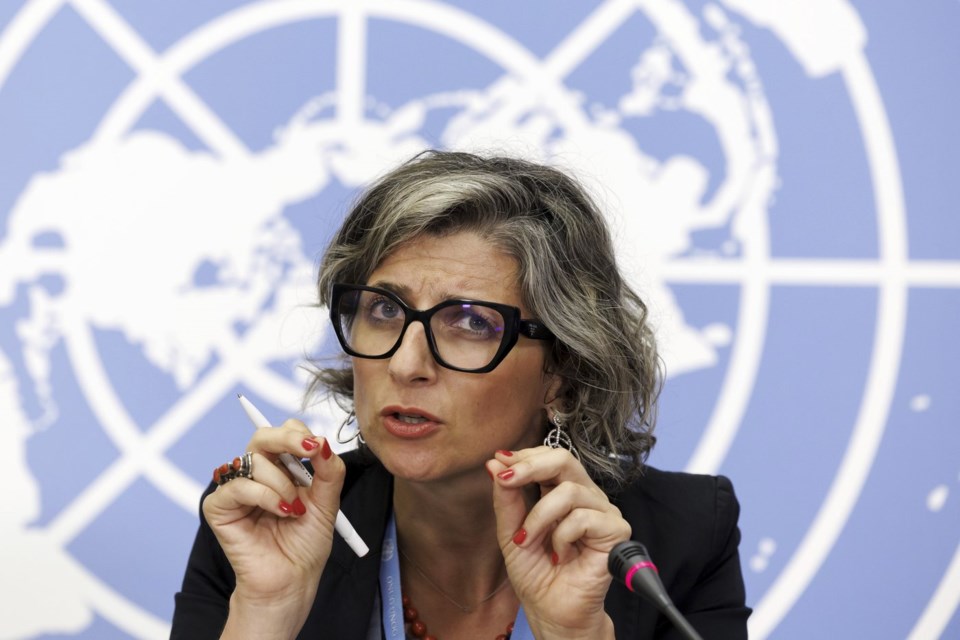A U.N. special rapporteur has been sanctioned by the United States over her work as an independent investigator scrutinizing human rights abuses in the Palestinian territories, with Washington decrying what it called a “campaign of political and economic warfare” against the U.S. and Israel.
Francesca Albanese is a high-profile member of a group of experts chosen by the 47-member U.N. Human Rights Council in Geneva. They report to the body as a means of monitoring human rights records in various countries and the global observance of specific rights.
Special rapporteurs don't represent the U.N. and have no formal authority. Still, their reports can step up pressure on countries, while their findings inform prosecutors at the International Criminal Court and other venues working on transnational justice cases.
U.S. Secretary of State Marco Rubio said in a statement announcing sanctions against Albanese on Wednesday that she “has spewed unabashed antisemitism, expressed support for terrorism, and open contempt for the United States, Israel and the West.”
Albanese said Thursday that she believed the sanctions were “calculated to weaken my mission.” She said at a news conference in Slovenia that “I’ll continue to do what I have to do.”
She questioned why she had been sanctioned — “for having exposed a genocide? For having denounced the system? They never challenged me on the facts.”
The U.N. high commissioner for human rights, Volker Türk, called for a “prompt reversal” of the U.S. sanctions. He added that “even in face of fierce disagreement, U.N. member states should engage substantively and constructively, rather than resort to punitive measures.”
Prominent expert
Albanese, an Italian human rights lawyer, has developed an unusually high profile as the special rapporteur for the West Bank and Gaza, a post she has held since May 2022.
Last week, she named several large U.S. companies among those aiding Israel as it fights a war with Hamas in Gaza, saying her report “shows why Israel’s genocide continues: because it is lucrative for many.”
Israel has long had a rocky relationship with the Human Rights Council, Albanese and previous rapporteurs, accusing them of bias. It has refused to cooperate with a special “Commission of Inquiry” established following a 2021 conflict with Hamas.
Albanese has been vocal about what she describes as a genocide by Israel against Palestinians in Gaza. Israel and the U.S., which provides military support to its close ally, have strongly denied the accusation.
‘Nothing justifies what Israel is doing’
In recent weeks, Albanese issued a series of letters urging other countries to pressure Israel, including through sanctions, to end its deadly bombardment of the Gaza Strip. She also has been a strong supporter of arrest warrants issued by the International Criminal Court against Israeli officials, including Prime Minister Benjamin Netanyahu for allegations of war crimes.
Albanese said at a news conference last year that she has “always been attacked since the very beginning of my mandate,” adding that criticism wouldn't force her to step down.
“It just infuriates me, it pisses me off, of course it does, but then it creates even more pressure not to step back,” she said. “Human rights work is first and foremost amplifying the voice of people who are not heard.”
She added that “of course, one condemned Hamas — how not to condemn Hamas? But at the same time, nothing justifies what Israel is doing.”
Albanese became an affiliate scholar at the Institute for the Study of International Migration at Georgetown University in 2015, and has taught and lectured in recent years at various universities in Europe and the Middle East. She also has written publications and opinions on Palestinian issues.
Albanese worked between 2003 and 2013 with arms of the U.N., including the legal affairs department of the U.N. Palestinian aid agency, UNRWA, and the U.N. human rights office, according to her biography on the Georgetown website.
She was in Washington between 2013 and 2015 and worked for an American nongovernmental organization, Project Concern International, as an adviser on protection issues during an Ebola outbreak in West Africa.
Member of a small group
Albanese is one of 13 current council-appointed experts on specific countries and territories.
Special rapporteurs, who document rights violations and abuses, usually have renewable mandates of one year and often work without the support of the country under investigation. There are rapporteurs for Afghanistan, Belarus, Burundi, Cambodia, North Korea, Eritrea, Iran, Myanmar and Russia. One on Syria is supposed to take office once the mandate of a long-serving commission of inquiry on the country ends.
There also are three country-specific “independent experts,” a role more focused on technical assistance, for the Central African Republic, Mali and Somalia.
Additionally, there are several dozen “thematic mandates,” which task experts or working groups to analyze phenomena related to particular human rights. Those include special rapporteurs on “torture and other cruel, inhuman or degrading treatment or punishment,” the human rights of migrants, the elimination of discrimination against people affected by leprosy and the sale, sexual exploitation and sexual abuse of children.
The Associated Press



